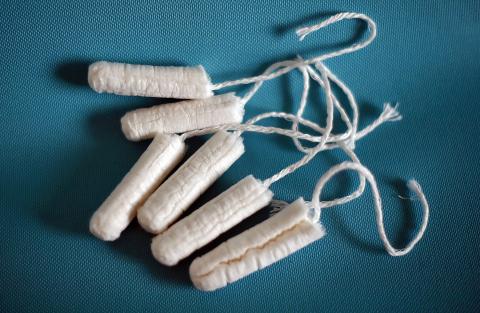Organic cotton tampons are often advertised as safer alternatives, but a study on Friday said they are not better than regular tampons at preventing toxic shock syndrome. Menstrual cups can also raise the risk of toxic shock, and should be boiled in between uses, said the report in Applied and Environmental Microbiology, a journal of the American Society for Microbiology.
Women have long been advised to change tampons regularly to avoid the risk of toxic shock syndrome, a rare but life-threatening condition that arises from a bacterial infection. Symptoms may include fever, vomiting, rash, muscle aches and organ failure.
In recent years, a number of new female hygiene products have hit the market, including tampons made from organic cotton and menstrual cups that can be rinsed between uses.

Photo: AFP
照片:法新社
To see how they measured up, researchers tested 11 kinds of tampons and four menstrual cups in the lab to study their effect on growth of a pathogen called Staphylococcus aureus, and also toxic shock syndrome toxin-1 (TSST-1) production. They inserted the tampons and cups into plastic bags, injected a liquid and a trace of bacteria isolated from a patient who had toxic shock in 2014, then sealed the bags and left them for eight hours.
They found it didn’t seem to matter what kind of material was in the tampon, rather it was the amount of air in between the fibers that seemed to raise the risk of bacterial growth.
“Our results did not support the hypothesis suggesting that tampons composed exclusively of organic cotton could be intrinsically safer than those made of mixed cotton and rayon,” said Gerard Lina, professor of microbiology at University Claude Bernard, in Lyon, France. “We observed that space between the fibers that contributes to intake of air in the vagina also represents the major site of S. aureus growth and TSST-1 production,” he added.
Meanwhile, menstrual cups seemed to allow even more bacteria to grow than tampons, again likely due to the additional air involved. At least one case has been documented in scientific literature of a woman coming down with toxic shock after using a menstrual cup.
“Over the years, it was postulated that perhaps if tampons were made from natural materials, toxic shock would be averted. The new research recently published clearly illustrates that this is not true,” said Adi Davidov, director of gynecology and robotic surgery at New York’s Staten Island University Hospital, who was not involved in the study. “Toxic shock can occur with any tampon material and even more frequently with the menstrual cups.”
According to Jill Rabin, co-chief of the division of ambulatory care at Northwell Health, a network of medical providers in New York, women should change tampons frequently. “If tampons and menstrual cups are used be sure to see your doctor at the first sign of any fever, chills or rash, and of course, remove the cup or tampon immediately.” (AFP)
有機棉條經常被宣傳為較安全的替代品,但上週五發布的一篇研究指出,這類產品對於防止中毒性休克症候群的發生,並沒有比普通棉條來得有效。美國微生物學協會期刊《應用及環境微生物學》這篇報告指出,月亮杯也會提高中毒性休克的風險,並且應該在替換使用時煮沸。
長久以來,醫界建議女性應該經常更換棉條,以避免中毒性休克症候群發生的風險。該症候群肇因於細菌感染,是一種少見但卻會對生命造成威脅的病情。症狀包括發燒、嘔吐、起疹子、肌肉疼痛,以及器官衰竭。
近年來,市面上出現若干種的新型女性衛生商品,包括有機棉做的棉條,以及能夠在替換過程中沖洗的月亮杯。
為了檢視這些產品是否合乎標準,研究人員在實驗室裡對十一種棉條及四種月亮杯進行測試,研究它們對金黃色葡萄球菌這種病原體增生可能造成的影響,以及「中毒性休克症候群毒素-1」的產生情形。研究人員將棉條與月亮杯放進塑膠袋中,注射一些液體到裡面,加入些許從二○一四年罹患中毒性休克的患者身上分離出來的細菌,然後將塑膠袋密封,放置八小時。
研究人員發現,棉條裡面的材質差異並非關鍵,反而是纖維間的空氣多寡有可能提高細菌增生的風險。
法國里昂第一大學的微生物學教授傑哈‧里納表示:「我們的研究結果並不支持以下假設,亦即全然只用有機棉製成的棉條,在本質上一定會比混和棉與人造纖維製作的棉條來得安全。」他補充說:「我們觀察到,纖維間的空隙導致空氣進入陰道中,而這些空隙正是金黃色葡萄球菌與『中毒性休克症候群毒素-1』生成的主要位置。」
在此同時,月亮杯跟棉條相比,似乎會讓更多細菌孳生,這同樣可能跟來自外部的空氣有關。科學文獻裡至少有一起病例記錄,是一位女性在使用月亮杯後罹患中毒性休克。
紐約史泰登島大學醫院的婦科暨機器人手術主任阿迪‧大衛朵夫表示:「多年來,總會有人揣測,認為如果用天然的原料製造棉條,就能夠避免中毒性休克。最近發表的這個新研究很清楚地闡釋這樣的說法是錯誤的。」大衛朵夫並未參與這份研究,他補充說:「中毒性休克可能會發生於任何材質的棉條,而月亮杯發生可能更加頻繁。」
紐約一間醫療服務供應網Northwell Health的門診部共同主任吉兒‧拉賓建議,女性應該要勤於更換棉條:「如果正在使用棉條和月亮杯,請務必要記得在發燒、發冷、起疹子等症狀出現的一開始就去看醫生,而且一定要馬上從體內取出月亮杯或棉條。
(台北時報章厚明譯)

A: As reality TV show “Culinary Class Wars” causes a sensation, it may be more difficult to make a reservation at the show’s judge Paik Jong-won’s Taipei restaurant, Bornga Korean BBQ. B: The other judge, Anh Sung-jae, also served as a guest chef at Regent Taipei last June. A: Korean food has become a new trend in Taiwan lately, and restaurants such as Samwon Garden are quite popular. B: But that restaurant is so pricey. A: Then try the more affordable places, like my favorite, OKAY Korean BBQ, or others such as Annyeong Korean BBQ and OvenMaru Chicken. A:

Colorado has taken a pioneering move towards protecting consumer privacy in the age of brain-computer interfaces. With the rise of neurotechnology, which involves technology that monitors and interacts with the brain, data privacy concerns are coming to a head. In response to growing anxieties, Colorado has become the first state in the US to pass an amendment that safeguards the privacy of human brainwaves. On April 17, Colorado announced an update to its Privacy Act, which went into effect on August 6. The new Colorado Privacy Act classifies brainwaves as “sensitive personal information,” offering them the same protections that

The Australian government will legislate for a ban on social media for children under 16, Prime Minister Anthony Albanese said on Thursday last week, in what it calls a world-leading package of measures that could become law late next year. Australia is trialing an age-verification system to assist in blocking children from accessing social media platforms, as part of a range of measures that include some of the toughest controls imposed by any country to date. Albanese cited the risks to physical and mental health of children from excessive social media use, in particular the risks to girls from harmful depictions of

Continued from yesterday(延續自昨日) https://www.taipeitimes.com/News/lang Neurotechnology used to be limited to scientific labs and hospital settings. However, many new devices that can record consumers’ brainwaves or analyze the brain in other ways have been launched in recent years. Often marketed outside the realm of medical equipment, these devices evade the existing safety and privacy standards for healthcare devices. Experts are raising concerns about this lack of oversight, fearing the potential for these tools to become mind-reading devices without users’ consent or knowledge. Other US states are considering similar regulations to protect their citizens in regard to neuro data gathered by technology companies. Colorado’s